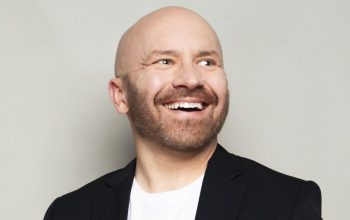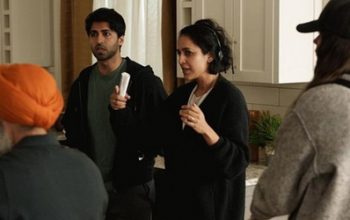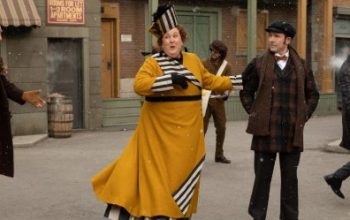Gangland Undercover is History’s mini-series based on the true story of Charles Falco, a man who went successfully undercover with three of the world’s deadliest biker gangs — and lived to tell his story. It premieres tonight on History in Canada, and we chatted with stars Damon Runyan (Charles Falco) and Paulino Nunes (Schizo) about the series and their roles.
What did each of you find most interesting or intriguing about your roles and this story?
Damon Runyan: I found the most intriguing part was that he actually made it out alive considering the risk that he put himself through and what he subjected himself to, although he didn’t really have a choice. I mean, it was either that or prison for 22 years. So, that was – for me, it was fascinating that a guy could be at the threshold of death every day and then get up another day and go right back and face it without any real timeline or he didn’t really have any nest, like a support network. He was doing it on his own. It was a one man mission where he had to self-finance it. He had to risk his life to find redemption.
Paulino Nunes: Interestingly enough just earlier in the year, I had been doing another role that required a lot of physical violence and kind of a darkness to it, and then the stuff that I normally do on television is nothing like this. I mean, this is unlike most of what’s on television anyway. It’s not even gritty – it’s beyond gritty; it’s filthy; it’s dirty-dirty. I don’t know what the next level beyond gritty is, but whatever that is, this is what this show is. And it’s always – and I hesitate to use the word “fun” because fun sounds so kind of glib – but there is something attractive about playing a character who, at least to start with, is so confident and sure and powerful and wields that power, that authority, in this subculture. It’s something that you can really sink your teeth into and I think there is a part of all of us that draws people to these types of subcultures. There is a part of us that would like to just be completely uncensored, and say and do whatever I feel in the moment and not feel any reservations about that or any guilt or not any repercussions. Just be the master of my domain and those around me. The physical violence in the show, as well as the emotional turmoil, can be really exhausting over all of those months. When it was time to finish, I was really glad to shed that skin and the beard.
How did each of you prepare for your roles?
DR: FI had never ridden a bike before, so I took a motorcycle course. I bought a bike. I got out on it as much as possible. I worked with a trainer, and we sort of structured workouts around preparing to just fight at any time. So, like, elbow smashes and throwing different combinations and basically being prepared to fight at any point. And then, of course, I spoke to a couple of different bikers and got kind of the world view on why they do it, and [Charles] Falco himself was readily available to me at any time. I spent a lot of time talking to him – well, he talked me through the process of what it was like, how the structure of the whole thing works and then getting into the mindsets of how you would survive that type of experience.
PN: That was one of the things that made this very attractive as well, is it was based on someone’s real experience and it wasn’t just a writer’s imagination of what that world would be like. There is just something about that that gives it kind of this reality that is in a lot of ways easier to act because you don’t have to deal with someone’s fantasy world of something which may have contradictions and may not make sense because it’s something that’s just purely from their imagination. Because this was a fact-based series, there was something really attractive about that because it was an opportunity to kind of sink into this world, which is actually a real world, a world that exists, happening right now.
It’s not so long since Sons of Anarchy ended, and although these are diverse stories, there are bound to be comparisons.
DR: They are vastly different shows in the sense that one does the infiltration of a bike gang and the other is about what it’s like to have a bike gang and to protect that entity. I think it’s obviously very right for a new biker show to come in and replace that need for that world or another perspective of that world. I also think we kind of fall into the Breaking Bad sort of world in terms of the film and landscape in which we shot and the characters that are inhabiting that life. I definitely think that there is a huge market for it.
Did you actually film in California?
PN: It was actually Arizona standing in for southern California, up in the desert. Those shots that you see of us riding down the highway on our bikes are shots of us actually riding down the desert highway on our bikes in Arizona, riding in formation like that, which was a fantastic experience. Damon and I have been talking about this a lot today. That whole feeling of brotherhood that you have when you are roaring down the highway with a bunch other guys. You have to have ultimate faith in them because any wrong move by anyone on a bike going at that speed can result in a very serious and life-threatening collision. And, when you’re flying down the highway with somebody a few feet in front of you, someone a few feet behind you, and someone to your side, you really have to trust that they are going to hold the line and you’ve got to hold the line. So, there is this loyalty and trust that is created just riding for a few days with these guys and you really get the sense of bonding and how important that is.
Was there interaction with any biker gangs, or have you received any feedback from one of those organizations?
DR: We haven’t heard any response whatsoever. It’s a fact-based show but it is also a dramatic fictionalization of the event. So, any likelihood that we would have any interaction with them would be very limited, I would hope.
PN: I will say one thing is that when we were down in Arizona, Charles Falco joined us on set and I had some interaction with him there. One thing that he said to me, and I suppose, you know, him having lived in this world for a number of years, I would take this to heart. He said, just kind of off-hand to me, “I’m so glad that you guys are telling my story.” That was a great nod of approval from him that he obviously felt that we were doing his story justice and we were showing the truth of what his experience was. And that meant a lot to me.
DR: The other thing to think about with the gangs – and this is Falco talking about this often – is that they don’t want to draw attention to themselves. They want to operate solely as an isolated club and whatever business they have with other gangs, they try to keep that as low profile as possible. So, I would think that in regards to a show they would want to distance themselves from that.
In the first episode, there’s a lot to establish, and a lot of narration from Falco’s perspective. Does that dynamic change as the episodes unfold?
DR: In the first episode, essentially we are just setting up the room. There is a surprise in Episode 6 that I will not give away, but, everything is so they come to obviously a dramatic conclusion. As the world gets played out and as he becomes more a part of the infiltration in both sides of the fence, his perspective is told more on screen as opposed to a narration.
There were a couple of moments in the first episode that left me breathless. What are you able to tease about the other five episodes?
DR: I think you’ll be surprised in the end how it turns out. It’s not what you expect it to be. Tune in.
PN: You’ve seen as much as the show as I have. And we saw a preview screening last Friday for cast and crew and, I got to tell you, I’m glad to hear that you said that you were, what was the word you used, you were “breathless?” That I’m sure continues throughout the show and I got to say that I was on the edge of my seat thinking, “Oh, what’s going to happen,” even though I know what’s going to happen next. I was kind of on the edge of my seat going, “I want to see what happens next.”
DR: I think, too, with the six-episode arc, that it’s hard not to tune in. It’s a quick ride. Where you get into some episodics where there are some lulls – I mean, even Breaking Bad at points had some lulls — and when you look at the season as a whole, this cuts all that out. We get right to the point in six episodes.
Photo Courtesy of History



Im calling bullshit on this show it show like a made up b-movie I know the biker life style and this is a bad joke not even a small hint of truth to it just to stooped
The series is a dramatic representation of a true story. Charles Falco is a former ATF confidential informant who successfully infiltrated three gangs instead of serving 20+ years in prison. It is television, but what it’s based on actually happened.
Based on a true story in general means things in the show are based on fact but there may be some parts that are embellished.
i love this show, i have no problem believing it happened just as charles says it did, i noticed that most of his critics are women that don’t want to admit to being treated like trash from the bikers they thought “loved” them, i find that sad actually. not to mention most of the women look just as charles described them {far from attractive}